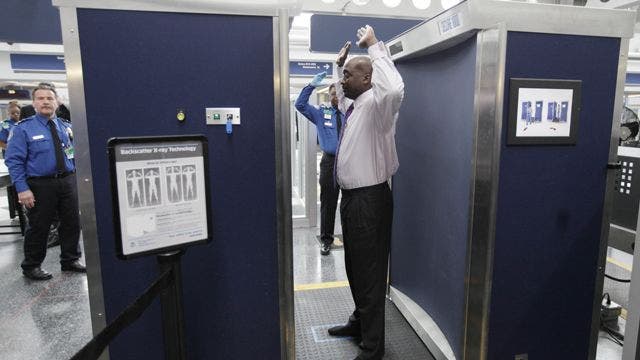Hopefully Texas will pass the law proposed by State Rep David Simpson that will make it criminal for TSA agents to touch the genitals of kids, and really anyone, without just cause or reasonable suspicion.
from FoxNews:
TSA to junk naked body airport scanners

Those airport scanners that leave nothing to the imagination are being scrapped by the Transportation Security Administration.
The agency is ending a contract with Rapiscan Systems, which manufactures the scanners which produce a naked image of travelers who pass through them. Privacy rights activists have complained that the scanners, first rolled out in 2007, constitute a virtual strip search. The TSA plans to continue using a scanner that is considered less invasive, and which makes a generic image that has been likened to a cartoon, or stick figure, yet highlights potential foreign objects on the traveler's body.
The TSA says the X-ray scanners will be gone by June because Rapiscan was not able to come up with a software fix to make the scanners comply with a Congressional mandate that the scanners better protect passenger privacy. Opponents of full-body scanners argue that strip searches without probable cause violate basic human rights. Governments do not have the right to make strip searches routine and mandatory, regardless of whether the strip search is done by physically removing clothes or by using technological means to remove the clothes.
“Due to its inability to deploy non-imaging Automated Target Recognition (ATR) software by the Congressionally-mandated June 2013 deadline, TSA has terminated its contract with Rapiscan," the agency said on its website. "By June 2013 travelers will only see machines which have ATR that allow for faster throughput. This means faster lanes for the traveler and enhanced security. As always, use of this technology is optional.”
In November, TSA officials told a Congressional committee the agency had spent $40 million on the nude-image Rapiscan machines and another $100 million on the less invasive model which will continue to be used. In all, the TSA has about 800 machines in operation at 200 airports.
Advocates say the naked body scanners machines are efficient at spotting threats and are much faster than administering strip searches. But they have also generated complaints from critics who say the X-ray exposure they subject passengers to could be a health risk. The European Union last year banned the use of backscatter scanners at European airports over health concerns.
"While TSA has told the public that the amount of radiation emitted from these machines is small, passengers and some scientific experts have raised questions about the impact of repeated exposure to this radiation," said Sen. Susan Collins (r-Maine), last month.
The agency is ending a contract with Rapiscan Systems, which manufactures the scanners which produce a naked image of travelers who pass through them. Privacy rights activists have complained that the scanners, first rolled out in 2007, constitute a virtual strip search. The TSA plans to continue using a scanner that is considered less invasive, and which makes a generic image that has been likened to a cartoon, or stick figure, yet highlights potential foreign objects on the traveler's body.
"A TSA agent in another room will see an image of your body that could include a revealing look at your entire body, including breasts, genitals, buttocks, and external medical devices."- American Civil Liberties Union
The TSA says the X-ray scanners will be gone by June because Rapiscan was not able to come up with a software fix to make the scanners comply with a Congressional mandate that the scanners better protect passenger privacy. Opponents of full-body scanners argue that strip searches without probable cause violate basic human rights. Governments do not have the right to make strip searches routine and mandatory, regardless of whether the strip search is done by physically removing clothes or by using technological means to remove the clothes.
“Due to its inability to deploy non-imaging Automated Target Recognition (ATR) software by the Congressionally-mandated June 2013 deadline, TSA has terminated its contract with Rapiscan," the agency said on its website. "By June 2013 travelers will only see machines which have ATR that allow for faster throughput. This means faster lanes for the traveler and enhanced security. As always, use of this technology is optional.”
In November, TSA officials told a Congressional committee the agency had spent $40 million on the nude-image Rapiscan machines and another $100 million on the less invasive model which will continue to be used. In all, the TSA has about 800 machines in operation at 200 airports.
Advocates say the naked body scanners machines are efficient at spotting threats and are much faster than administering strip searches. But they have also generated complaints from critics who say the X-ray exposure they subject passengers to could be a health risk. The European Union last year banned the use of backscatter scanners at European airports over health concerns.
"While TSA has told the public that the amount of radiation emitted from these machines is small, passengers and some scientific experts have raised questions about the impact of repeated exposure to this radiation," said Sen. Susan Collins (r-Maine), last month.
Read Rest of Story Here: http://www.foxnews.com/politics/2013/01/18/tsa-junks-naked-body-airport-scanners/#ixzz2JGtSwalm
No comments:
Post a Comment